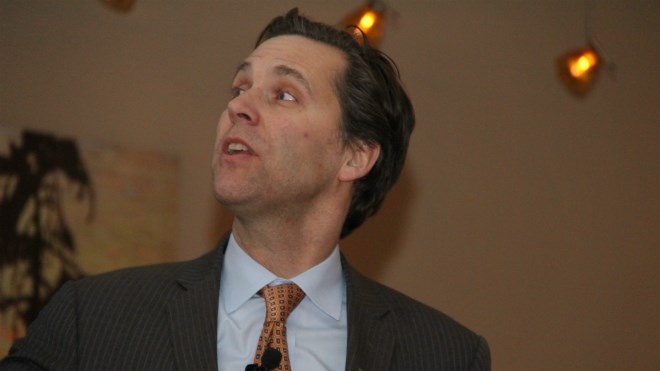Sudbury's economy should grow by two per cent in 2015, says a senior economist with TD Bank Financial Group.
Derek Burleton, TD Financial Group's deputy chief economist, shared his forecasts for the next year with the Sudbury Chamber of Commerce and local business leaders Thursday.
Burleton described Sudbury's economic growth as modest, and said diversification will be key to any economic expansion in Sudbury.
He praised the Sudbury Area Mining Supply and Service Association, but said diversification will also need to include industries outside of mining, such as tourism.
“Alberta is a classic case where they've been talking about diversification for years,” Burleton said. “They've done a bit of it, but it's been very limited. It just shows you how difficult it is.”
Burleton forecasted Sudbury's job growth will be even more modest, with an expansion of one per cent.
A low Canadian dollar, he said, will help manufacturing and exports, but will hurt retail.
As for commodities, he said TD Bank expects the price of nickel to increase in the next year, due to an ongoing export ban in Indonesia.
On Jan. 12, 2014, Indonesia, the world's largest nickel producer, banned all exports of nickel-containing ores.
“They're buying more time to develop more smelter activity on their own soil,” Burleton said.
With 11 processing plants scheduled for construction, Indonesia will be able to sell processed nickel to China at a higher rate of return than its unprocessed ore.
As of Friday morning nickel traded for US$7.6 per pound, but Burleton said the metal could approach $15 a pound in 2015 due to a supply shortage.
“We assume they (Indonesia) don't let up on their export ban,” he said.
Burleton said he was less enthusiastic about copper prices, which he expects to level off. Copper was trading at US$2.9 per pound Friday morning.
While the Ring of Fire has great potential, Burleton said he does not expect much movement in the near future to develop the remote chromite deposits due to the large upfront costs.
“Right now, it's just not optimistic enough,” he said.
While the province has committed $1 billion to build infrastructure for the Ring of Fire, Burleton said it seems unlikely the Federal government would make the same commitment, even with a projected $1.9-billion surplus for next year.
Burleton said 40 per cent of the federal surplus has been allocated to lower taxes, and the provinces will lobby for the rest to increase health care funding.
If the federal government does invest some of the surplus in infrastructure, Burleton said it would more likely choose to improve transit in the Greater Toronto Area, where there are more votes to be had ahead of an election.
The Globe and Mail reported in late November that falling oil prices could reduce the federal surplus to $100-million.
Join Sudbury.com+
- Messages
- Post a Listing
- Your Listings
- Your Profile
- Your Subscriptions
- Your Likes
- Your Business
- Support Local News
- Payment History
Sudbury.com+ members
Already a +member?
Not a +member?
Sign up for a Sudbury.com+ account for instant access to upcoming contests, local offers, auctions and so much more.
